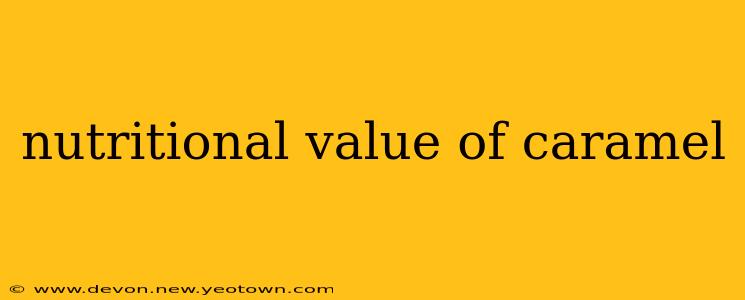Caramel. The mere mention of the word conjures images of gooey, golden swirls, the rich aroma wafting through the air, and that irresistible sweetness melting on your tongue. But beyond its delightful taste and texture, what's the real nutritional story behind this beloved treat? Let's delve into the surprising (and sometimes not-so-surprising) nutritional value of caramel.
It's important to preface this by saying that the nutritional content of caramel can vary significantly depending on the recipe. Homemade caramel, for instance, will differ greatly from commercially produced caramel candies, sauces, or fillings. Factors like added ingredients (salt, butter, cream), the type of sugar used (cane sugar, brown sugar, etc.), and processing methods all play a role.
What are the main ingredients in caramel?
The foundation of most caramel is simply sugar. Specifically, sucrose, the common table sugar, undergoes a process called caramelization, where it's heated to high temperatures, causing a chemical reaction that changes its color and flavor. This process creates the characteristic golden-brown hue and rich, slightly bitter taste we associate with caramel. But most caramel recipes go beyond just sugar. Many include butter, cream, salt, and sometimes vanilla extract, all of which contribute to the final flavor profile and nutritional content.
Is caramel healthy?
This is a question with a nuanced answer. In short, no, caramel isn't generally considered a health food. Its primary component is sugar, which is high in calories and can contribute to weight gain if consumed in excess. Furthermore, the high sugar content can impact blood sugar levels and contribute to dental problems.
However, it's crucial to remember moderation. Occasional indulgence in small amounts of high-quality caramel shouldn't necessarily derail a healthy diet.
What are the calories in caramel?
The caloric content of caramel varies wildly depending on the recipe and serving size. A typical teaspoon of commercially produced caramel sauce can contain anywhere from 20-40 calories, primarily from sugar. However, caramel candies or treats often contain added ingredients, resulting in a higher calorie count per serving.
What are the nutrients in caramel?
While caramel isn't a significant source of essential nutrients, it does contain trace amounts of some minerals. For example, if butter is used in the recipe, you’ll get small amounts of fat-soluble vitamins like vitamin A and E. Depending on the type of sugar used, there might be trace minerals. However, these amounts are negligible compared to the high sugar content.
Does caramel contain any vitamins or minerals?
As mentioned above, the nutritional profile of caramel is primarily dominated by carbohydrates (from sugar). While trace amounts of vitamins and minerals might be present depending on added ingredients, caramel isn't a significant source of any essential vitamins or minerals. It's not something you should rely on for any nutritional value.
Is caramel good for weight loss?
No, caramel is not conducive to weight loss. Its high sugar and calorie content contribute to weight gain rather than loss. If weight management is a goal, limiting caramel consumption or substituting it with healthier alternatives is advisable.
What are the health risks associated with eating too much caramel?
Excessive caramel consumption can lead to several health problems, including:
- Weight gain: High sugar and calorie content contribute to excess calorie intake.
- Blood sugar spikes: The high sugar content can cause rapid increases in blood sugar levels.
- Dental problems: Sugar promotes tooth decay and cavities.
- Increased risk of chronic diseases: High sugar intake is linked to an increased risk of type 2 diabetes, heart disease, and other chronic illnesses.
In conclusion, caramel is a delicious treat to be enjoyed sparingly. Understanding its nutritional composition allows for informed choices about consumption, prioritizing moderation and balance within a healthy diet. Remember to always check the nutrition label on commercially produced caramel products for accurate information about the specific ingredients and nutritional content.

